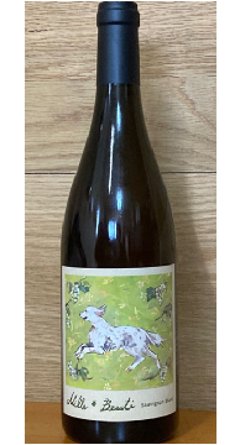VINSYの ショップ紹介
猪鹿蝶 アンバー 2024 / Inoshikachou Amber新醸造長による初リリースの希少なワイン!VTG 2024タイプ オレンジ(ドライ)SO2 最小限生産者 カーブドッチつくり手 草野竜征地域 日本・新潟県新潟市角田浜品種 ピノ・ブラン、セミヨン、ソーヴィニヨン・ブランボディ ミディアムABV 10.5%容量 750ml保管 要冷蔵ジンジャーやオレンジピールの華やかな香り。優しい酸に、オレンジピールのビター感とミネラル感、甘酸っぱい果実味が全開に広がるアンバーワイン。●ワイナリー紹介(カーブドッチ)カーブドッチ(Cave d’Occi)は新潟市街地から南西方向に車で約30分、日本海に沿ってのびやかに横たわる角田山の麓にあります。見渡す限りの広大なぶどう畑に囲まれた一帯には、訪れた人がワイン造りの現場に触れ、ワインや料理を愉しみ、豊かな時間を過ごしていただけるような空間やサービスが揃っています。カーブドッチの始まりは1992年、今から30年ほど前に遡ります。
新潟の砂丘地に初めてワインぶどうの木を植えたのは1992年。新潟市から西へ向かう国道から800m奥に入った不便な場所を選んだのは、ワイナリーは畑に囲まれて当然という考えからでした。当初は一日数組のお客様を畑と工場へ案内し、栽培と醸造を直接見ていただいていました。
時間とともに来訪者は増え、レストラン、ベーカリー、ショップ、温泉、ホテルを備えた“一日過ごせるワイナリー”へと発展。アクセス道路も舗装され、カーブドッチは“小さな村”のような存在へと進化しています。
季節ごとにぶどう畑は姿を変えます。花芽が一気に伸びる6月、実りが静かに進む9月、剪定後に整然と葡萄樹が並ぶ2月。それらの姿を一年を通して感じられるよう、2つの宿泊施設「ヴィネスパ」「トラヴィーニュ」も併設しています。「ぶどうの伸びる音を聞きに来てほしい」——そんな思いで造られた滞在型ワイナリーです。
新潟・角田山麓を選んだ理由はテロワール。砂地土壌は繊細なワインの風味を引き出し、海風が一年中吹くことで病害を抑えます。夏は熱集積が高く乾燥気味、冬は新潟では珍しい少雪で、湿度が樹や芽を守ります。堆肥や草生栽培で土を育て、この土地らしさをワインに映す努力を続けています。
40種以上を試し、現在も19種を栽培。転機となったのは2005年、スペイン大西洋岸で出会ったアルバリーニョでした。砂質土壌でジャスミンや中国茶を思わせる独特の香りが生まれることから“適性品種”として期待されています。
果実を原料とするワインは年ごとに味わいが変わり、不作の年ほど造り手の思索と工夫が味に表れます。変化を受け入れて楽しむ文化こそがワインの魅力。クラシックな「サブル」、ナチュラルなニュアンスの「どうぶつシリーズ」、食用ぶどうを使ったポップな「FUNPYシリーズ」まで、多様なスタイルを展開しています。ヨーロッパのように日本ワインが日常に寄り添う未来を目指し、カーブドッチは今日もワインを造り続けています。Inoshikachou Amber 2024A rare first release crafted by the new head winemaker.Vintage: 2024Type: Orange (Dry)SO2: MinimalProducer: Cave d’OcciWinemaker: Ryusei KusanoRegion: Kakudahama, Niigata, JapanVarieties: Pinot Blanc, Semillon, Sauvignon BlancBody: MediumABV: 10.5%Volume: 750mlStorage: Keep RefrigeratedBright aromas of ginger and orange peel lead into gentle acidity, layered citrus peel bitterness, minerality and vivid sweet-sour fruit that bursts across the palate.●About Winery (Cave d’Occi)●About Winery (Cave d’Occi)Cave d’Occi is located at the foot of Mt. Kakuda, about 30 minutes by car southwest of Niigata City, along the Sea of Japan. The winery is surrounded by expansive vineyards, offering visitors a place to experience winemaking up close, enjoy wine and food, and spend a relaxing and fulfilling time. The story began in 1992, when vines were first planted in the coastal sand dunes of the area.
At the time, choosing a site 800 meters off the main road was unusual, but the founders believed that a winery should naturally be surrounded by its own vineyards. In the early days, only a few guests visited per day, and each was guided through the vineyard and winery to see the cultivation and winemaking firsthand.
As the years passed, more visitors began arriving from Niigata, Tokyo and beyond. The winery expanded, adding a restaurant, bakery, shop, hot spring and hotels—transforming Cave d’Occi into a small village where guests can spend the entire day. The once bumpy farm road was eventually paved and became a city road, improving accessibility while preserving the winery’s intimate connection with the land.
Each season reveals a different side of the vineyard: • June — rapid shoot growth and vibrant flowering • September — quiet ripening clusters and busy vignerons • February — pruned vines neatly lined with Mt. Kakuda beyond To help visitors enjoy these scenes in every season, two accommodation facilities—Vinespa and Travoid—were established. “Stay with us, and listen to the grapes grow” expresses the winery’s desire to allow guests to fully experience the land where the wines are born.
The Kakuda foothills were chosen for their terroir. The sandy soils are ideal for wine grapes, producing delicate and refined wines. Although low in nutrients, the soils are enriched each year through compost and cover cropping. The proximity to the sea brings steady westerly winds that reduce disease pressure. Summers are warm with high heat accumulation and low rainfall, while winters have surprisingly little snow for Niigata, with humidity that protects the vines and buds.
Since its founding, Cave d’Occi has experimented with more than 40 grape varieties and now cultivates about 19. A turning point arrived in 2005 when the team encountered Albariño on Spain’s Atlantic coast. Its suitability to sandy soils, ease of cultivation and distinctive jasmine- and tea-like aromas made it a promising match for the estate.
Wine, being made from fruit, differs from year to year, and even in challenging vintages, thoughtful decisions and persistence can result in wonderful wines. This human element and open acceptance of variation are at the heart of wine culture—unlike other alcohol categories where uniformity is the norm.
Cave d’Occi produces a diverse range of wines: classical cuvées such as “Sable,” the gentle and soothing “Animal Series,” and the playful “FUNPY Series” made from table grapes. Rather than committing to a single style, the winery aims to create wines that resonate with many different palates. Inspired by Europe, where local wines are part of everyday life, Cave d’Occi hopes to foster a similar culture in Japan, where people can enjoy Japanese wine naturally and daily.
もっと見る


























